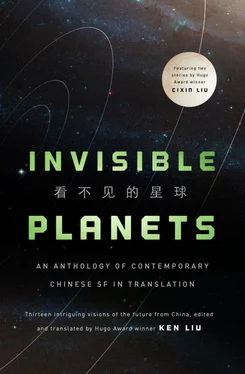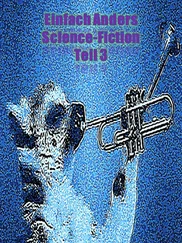To round out the collection and provide a more comprehensive overview of Chinese science fiction, I’ve included three essays at the end of the book by Chinese authors and scholars. Liu Cixin’s essay, “The Worst of All Possible Universes and the Best of All Possible Earths,” gives a historical overview of the genre in China and situates his own rise to prominence as the premier Chinese science fiction author within that context. Chen Qiufan’s “The Torn Generation” gives the view of a younger generation of authors trying to come to terms with the tumultuous transformations around them. Finally, the essay by Xia Jia, who holds the first Ph.D. degree issued for a specialization in the study of Chinese science fiction, “What Makes Chinese Science Fiction Chinese?”, offers a starting point for academic analysis of this body of work.
* * *
Noted translator William Weaver compared translation to a performing art. I like that metaphor. When doing a translation, I’m engaging in a cultural and linguistic performance, an attempt to re-create an artifact in a new medium. It is a humbling and thrilling experience.
I feel incredibly privileged to have had the chance to work with the authors in this anthology. In many instances, what began as professional collaboration has turned into personal friendship. From them I’ve learned much not just about translation, but also about writing fiction and living life across the boundaries of cultures and languages. I’m grateful that they entrusted their work to me.
I hope you enjoy the result.
A fiction writer, screenwriter, and columnist—with a side gig as a product marketing manager for Baidu, the Chinese web giant—Chen Qiufan (a.k.a. Stanley Chan) has published fiction in venues such as Science Fiction World, Esquire, Chutzpah!, and ZUI Found. Liu Cixin, China’s most prominent science fiction author, praised Chen’s debut novel, The Waste Tide (2013), as “the pinnacle of near-future SF writing.” Chen has garnered numerous literary awards, including Taiwan’s Dragon Fantasy Award and China’s Galaxy (Yinhe) and Nebula (Xingyun) Awards. In English translation, he has been featured in markets such as Clarkesworld, Lightspeed, Interzone, and The Magazine of Fantasy & Science Fiction. “The Fish of Lijiang” won a Science Fiction and Fantasy Translation Award in 2012, and “The Year of the Rat” was selected by Laird Barron for The Year’s Best Weird Fiction: Volume One.
The three stories collected here, “The Year of the Rat,” “The Fish of Lijiang,” and “The Flower of Shazui,” showcase Chen’s unique aesthetic of melding a global, post-cyberpunk sensibility with China’s traditions and complex historical legacy. By turns cynical, hopeful, playful, and didactic, Chen captures the zeitgeist of contemporary China, a culture going through a shocking transition and transformation. For more on how Chinese science fiction reflects this aspect of the Chinese experience, see Chen’s essay, “The Torn Generation,” at the end of this book.
A native of Shantou, Guangdong Province, and a graduate of Peking University, one of the China’s most elite colleges, Chen speaks the Shantou topolect as well as Cantonese, Mandarin, and English (the spelling of his English name [“Chan”] reflects the Cantonese pronunciation). A language virtuoso, he has written speculative fiction stories in Classical Chinese—a feat akin to a contemporary English writer composing a story in the language of Chaucer—as well as Cantonese and Modern Standard Chinese. The linguistic divisions and diversity of his native land provide both backdrop and metaphor for his novel The Waste Tide, which I’m translating into English. “The Flower of Shazui” is set in the same universe as The Waste Tide and offers a glimpse into that world.
It’s getting dark again. We’ve been in this hellhole for two days, but we haven’t even seen a single rat’s hair.
My socks feel like greasy dishrags, so irritating that I want to punch someone. My stomach is cramping up from hunger, but I force my feet to keep moving. Wet leaves slap me in the face like open hands. It hurts.
I want to return the biology textbook in my backpack to Pea and tell him, This stupid book has eight hundred seventy-two pages . I also want to give him back his pair of glasses, even though it’s not heavy, not heavy at all.
Pea is dead.
The Drill Instructor said that the insurance company would pay his parents something. He didn’t say how much.
Pea’s parents would want something to remember him by. So I had taken the glasses out of his pocket and that goddamned book out of his waterproof backpack. Maybe this way his parents would remember how their son was a good student, unlike the rest of us.
Pea’s real name is Meng Xian. But we all called him “Pea” because one, he was short and skinny like a pea sprout, and two, he was always joking that the friar who experimented with peas, Gregor “Meng-De-Er” Mendel, was his ancestor.
Here’s what they said happened: When the platoon was marching across the top of the dam of the abandoned reservoir, Pea noticed a rare plant growing out of the cracks in the muddy concrete at the edge of the dam. He broke formation to collect it.
Maybe it was his bad eyesight, or maybe that heavy book threw him off balance. Anyway, the last thing everyone saw was Pea, looking really like a green pea, rolling, bouncing down the curved slope of the side of the dam for a hundred meters and more, until finally his body abruptly stopped, impaled on a sharp branch sticking out of the water.
The Drill Instructor directed us to retrieve the body and wrap it in a body bag. His lips moved for a bit, then stopped. I knew what he wanted to say—we’d all heard him say it often enough—but he restrained himself. Actually, I kind of wanted to hear him say it.
You college kids are idiots. You don’t even know how to stay alive.
He’s right.
Someone taps me on the shoulder. It’s Black Cannon. He smiles at me apologetically. “Time to eat.”
I’m surprised at how friendly Black Cannon is toward me. Maybe it’s because when Pea died, Black Cannon was walking right by him. And now he feels sorry that he didn’t grab Pea in time.
I sit next to the bonfire to dry my socks. The rice tastes like crap mixed with the smell from wet socks baking by the fire.
Goddamn it. I’m actually crying.
* * *
The first time I spoke to Pea was at the end of last year, at the university’s mobilization meeting. A bright red banner hung across the front of the auditorium: “It’s honorable to love the country and support the army; it’s glorious to protect the people and kill rats.” An endless stream of school administrators took turns at the podium to give speeches.
I sat next to Pea by coincidence. I was an undergraduate majoring in Chinese literature; he was a graduate student in the biology department. We had nothing in common except neither of us could find jobs after graduation. Our files had to stay with the school while we hung around for another year, or maybe even longer.
In my case, I had deliberately failed my Classical Chinese exam so I could stay in school. I hated the thought of looking for a job, renting an apartment, getting to work at nine A.M. just so I could look forward to five P.M., dealing with office politics, etc., etc. School was much more agreeable: I got to download music and movies for free; the cafeteria was cheap (ten yuan guaranteed a full stomach); I slept until afternoon every day and then played some basketball. There were also pretty girls all around—of course, I could only look, not touch.
Читать дальше












